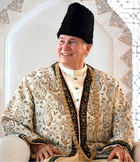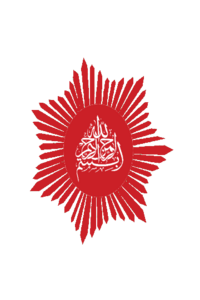Pamiran Federation: Difference between revisions
m (1 revision imported) |
m (→Government) |
||
| Line 149: | Line 149: | ||
{{multiple image | {{multiple image | ||
|align=right | |align=right | ||
|image1= | |image1=Azamat.png | ||
|width1= | |width1=140 | ||
|caption1= | |caption1=<div style="text-align: center;">[[Khermangir]]</div> | ||
|alt1= | |alt1= | ||
|width2=124 | |width2=124 | ||
|caption2= {{wp|Crown Prince| | |caption2= <div style="text-align: center;">{{wp|Crown Prince|Mirza}} [[Alim]]</div> | ||
|image2= | |image2=Emomali_Rahmon-1.jpg | ||
|alt2= | |alt2= | ||
}} | }} | ||
Revision as of 21:31, 16 February 2020
Sultanate of Kodesh Qodeşistan Sultanlyk قوديشييي صولتانليق | |
|---|---|
| Capital | Qalah |
| Official languages | Ömüric |
| Recognised national languages | |
| Recognised regional languages | |
| Ethnic groups | |
| Religion | Irsad (~96%) Other (~4%) |
| Demonym(s) | Kodeshi |
| Government | Unitary parliamentary absolute monarchy |
• Sultan | Azamat IV |
• Weliahd | Şehzade Alim |
• Sadrazam | Awni Josqun Paşa |
| Legislature | Grand Assembly |
| Population | |
• Estimate | 78,560,500 |
| GDP (PPP) | estimate |
• Total | $887 Billion |
• Per capita | $11,300 |
Kodesh (Ömüric: قوديسهيستان Qodeşistan), officially the Grand Omuran State (Ömüric: ضيوليتءي ولانءيي ومورييي Dewlet-i Ulan-ýi Ömüriýe] is a country in Catai. It is bordered by the north and north-west by Ústekia and Dýnaria and Uwhistan respectively, and shares a maritime border with Newrey. Qalah is the capital and largest city. Its diverse population is estimated to be around 78.5 million.
Kodesh has been at the crossroads of civilizations for centuries. It was part of the eastern fringes of the Artakhshathran empire. In medieval times, Qalah was one of the great cities of the Irsadic world and an important stop on the route used for trade with East Catai. The Türük peoples began migrating to the area after the 7th century and became the majority around the 14th and 15th centuries. Irsad arrived earlier, penetrating the Safar kingdoms in the 3rd century and becoming the majority religion by the 6th, which was quickly adopted by the migrating Türük peoples.
Etymology
The name of Kodesh (Ömüric: Qodeşistan) can be divided into two components: the exonym Qodeş and the Safari suffix -stan meaning "place of" or "country". The exact meaning of Qodeş is not known, though it has been posited to be from Mzincun Kadesh (קדש Kadesh) meaning "Holy, sancitified". The name first appeared for the peninsula on Asuran maps in the 14th century, but was not applied to modern Kodesh until the 18th century, and was uncommon internally until the late 20th.
The country is formally known as the Grand Omuran State (Ömüric: ضيوليتءي ولانءيي ومورييي Dewlet-i Ulan-ýi Ömüriýe, Ürüqish: ولان ومورلو ضويليتي Ulan Ömürlü Dewleti, Safari: بوزورگي اموريستون Buzurgi Âmûriston), and is sometimes referred to as Omure and Omuristan.
Kodesh is also known by other names depending on the ethnic group. The Türüq peoples call it Turuqey (Ürüqish: وروقييي Türüqiýe, Qushuqic: طوروقييا Türüqïya, Tekish: ققوروقا Qürüqa, Sygiz: طورقييا Türqiya, Toghic: قيرقا Qirqa), meaning land of the Türüqs. The Sakhti and Safar peoples known it as Osmonistan (Safar: وسمونيستون Osmoniston, Sakhti: وسمونيستان Osmönestan).
History
Geography
Politics
Government
Kodesh is an absolute monarchy. The country's constitution, an uncodified collection of royal decrees, sets out that the sultan must comply with Irsadic law, and do nothing to contradict the message of the Nashwad. No organised political parties or national elections are permitted. Critics regard it as a totalitarian autocracy lacking any sign of democracy, and it is often rated high among the most authoritarian governments in Aeia.
In the absence of national elections and political parties, politics in Kodesh takes place in three distinct arenas: within the royal family and court, between the court and the provincial governors (häkim), and between the provincial governors and the rest of Kodeshi society. The provincial governors are themselves often de facto hereditary positions which mimic the royal court on a smaller scale. Outside of the royal and provincial courts, participation in the political process is limited to a relatively small segment of the population and takes the form of the royal court consulting with the ulema, tribal leaders (baştutan) and members of important commercial families on major decisions.
By custom, all males of full age have a right to petition the sultan directly through the traditional tribal meeting known as the maslahat. In many ways the approach to government differs little from the traditional system of tribal rule. Tribal and ethnic identity remains strong and, outside of the royal court, political influence is frequently determined by tribal affiliation, with baştutans maintaining a considerable degree of influence over local and national events. Attempts to widen political participation over the past century have failed due to internal resistance, though since the 1960s several 'extra-ordinary' parliaments (mejlis) have been called to examine certain crises, though members were appointed or elected on limited suffrage.
Foreign Relations and Military
Administrative Divisions
Demographics
Ethnic Groups
The word Ömür or Ömüran (Ömürler) also has a wider meaning in a historical context because, at times, especially in the past, it has been used to refer to all Muridin inhabitants of Kodesh irrespective of their ethnicity. The question of ethnicity in modern Kodesh is a highly debated and difficult issue.
Since 1968, census have included the option of ethnicity. Ömüran is commonly defined as a civic identity, as it includes members of all ethnicities and languages bound by citizenship, loyalty to the House of Ömür, and primary or secondary use of the Ömüric dialect of Ürüqic. Most Ömürans also identify either as the various Türük or Pihranic peoples ethnically, and the numbers change depending on the representation of the question.
The Sakhti peoples are the natives of the northern highlands, and speak the various Sakhti languages, while the Safar peoples are native to the south of the country, though they are largely concentrated in the coasts, capital, and south-western islands. Other significant minorities include the Uwhistanis, largely located on the border with Uwhistan, and the largely Alydian Elhazian people, largely concentrated on the Elhazian border.
Languages
Religion
There are no official statistics of people's religious beliefs nor is it asked in the ordinary census. According to the government, 96.2 percent of the Kodeshi population is Muridin; other sources have given estimates ranging from as much as 98.4 percent to as low as 82 percent. The most popular sect is the Iqbali school
The Sultan is considered the highest religious authority in the country, though the active interpretation of the Iqbali school of thought, operation of the country's 70,000 registered masjids and mazārs, and employment of local and provincial imams is by the Ministry of Religious Affairs. In a special 2016 survey on religious affiliation; 96% of respondents indicated they were Muridins, followed by 3% who said they were Alydian, and 1% who affiliated with other religions or none.
Irsad was introduced to the province by Muridin traders of the Mufidi fiqh, as well as Sufi dervishes from Majula and Arabekh, in the xth century. Over the yth and zth centuries, Irsadic militant campaign led largely by Ürüq sultans conquered Alydian, Göktanri, and Faelhat kingdoms and various communities. Irsadic dominance of the region was solidified by the Sandarak Sultanate, and its successor the Sultanate of Kodesh.




